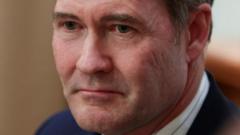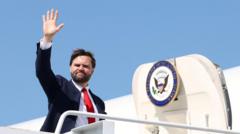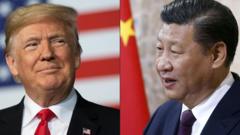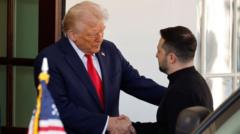**The recent removal of Michael Waltz as national security adviser and his replacement with Marco Rubio highlights internal tensions within the Trump administration as it grapples with international relations issues.**
**Trump Reshuffles National Security Team Amid Tensions**

**Trump Reshuffles National Security Team Amid Tensions**
**President replaces security adviser with an eye on diplomacy.**
Trump's decision to remove Michael Waltz from his post as national security adviser has sent ripples through the White House, with Secretary of State Marco Rubio stepping in as his interim replacement. This significant shake-up is the first major personnel change during Trump's second term, a move he initially aimed to avoid.
The transition comes after Waltz faced scrutiny for his role in a security breach involving a sensitive military operation in Yemen, which was exposed when he inadvertently included a journalist in a group chat on Signal. Even prior to this incident, Waltz's hawkish stance conflicted with the president's aspirations for a nuclear deal with Iran and improved relations with Russia.
Rubio, who will simultaneously juggle both the national security and secretary of state roles—an unusual occurrence since Henry Kissinger's tenure—will now guide U.S. foreign policy during a pivotal moment. The forthcoming decision on a new national security adviser is crucial, as differing strategies on complex matters concerning China, Russia, and Iran have emerged among Trump’s senior advisors.
In other developments, reports indicate a fund backed by Abu Dhabi is set to make a substantial investment using cryptocurrencies associated with the Trump family's business. Meanwhile, Elon Musk's confidence in the administration's budget reforms appears to wane following the president's initial 100 days in office.
As Trump reshapes his administration, the international community watches closely, readjusting its actions and alliances in response to the evolving political landscape. Critics also question whether Trump's methods are unprecedented, with historians evaluating the impact of his leadership style during this critical juncture in U.S. history.
The transition comes after Waltz faced scrutiny for his role in a security breach involving a sensitive military operation in Yemen, which was exposed when he inadvertently included a journalist in a group chat on Signal. Even prior to this incident, Waltz's hawkish stance conflicted with the president's aspirations for a nuclear deal with Iran and improved relations with Russia.
Rubio, who will simultaneously juggle both the national security and secretary of state roles—an unusual occurrence since Henry Kissinger's tenure—will now guide U.S. foreign policy during a pivotal moment. The forthcoming decision on a new national security adviser is crucial, as differing strategies on complex matters concerning China, Russia, and Iran have emerged among Trump’s senior advisors.
In other developments, reports indicate a fund backed by Abu Dhabi is set to make a substantial investment using cryptocurrencies associated with the Trump family's business. Meanwhile, Elon Musk's confidence in the administration's budget reforms appears to wane following the president's initial 100 days in office.
As Trump reshapes his administration, the international community watches closely, readjusting its actions and alliances in response to the evolving political landscape. Critics also question whether Trump's methods are unprecedented, with historians evaluating the impact of his leadership style during this critical juncture in U.S. history.




















